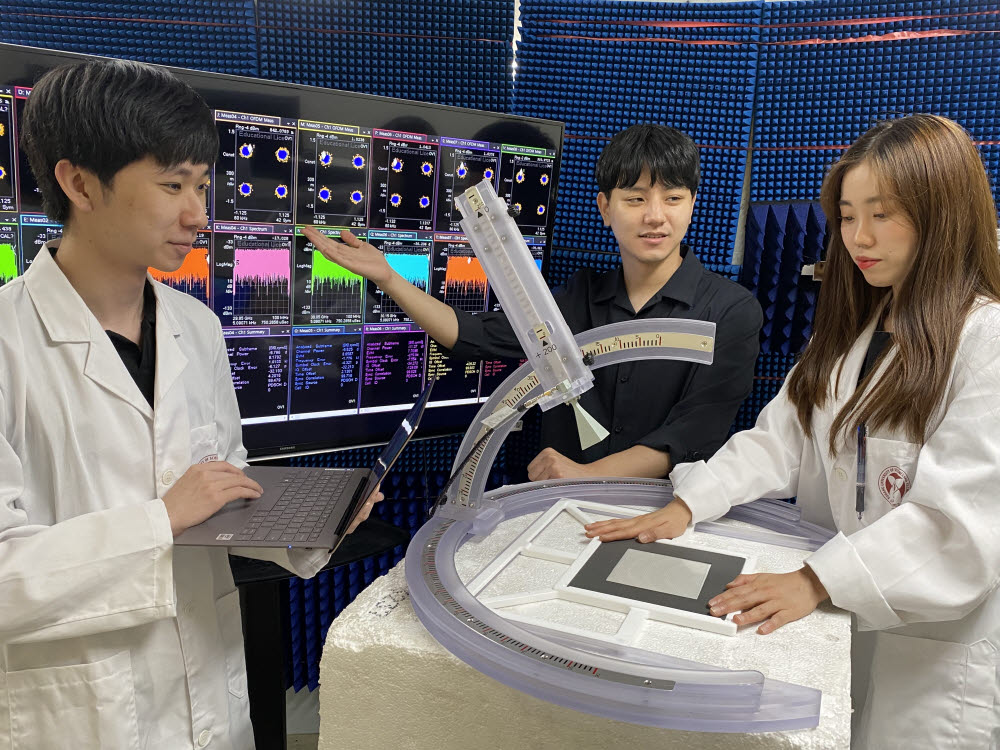
PR
 <LG U+ announced on the 18th that it will conduct a joint industry-academic study with Pohang University of Science and Technology on the reconfigurable intelligent surface (RIS) technology, a key antenna technology for 6G mobile communication. A research team led by Hong Won-bin, a professor at Pohang University of Science and Technology, tested the performance of RIS in a radio wave testing room. >
<LG U+ announced on the 18th that it will conduct a joint industry-academic study with Pohang University of Science and Technology on the reconfigurable intelligent surface (RIS) technology, a key antenna technology for 6G mobile communication. A research team led by Hong Won-bin, a professor at Pohang University of Science and Technology, tested the performance of RIS in a radio wave testing room. >
LG U+ will conduct a joint industry-academic study with Pohang University of Science and Technology on 'reconfigurable intelligent surface (RIS)' technology, a key antenna technology for 6th generation (6G) mobile communication.
LG U+ is conducting industry-academic cooperation projects with a research team led by Pohang University professor Hong Won-bin, who has been conducting leading research in 6G and millimeter wave fields. RIS performance will be checked in Terahertz band, which is a candidate frequency band for 6G. Earlier, since last year, LG U+ has also cooperated with domestic antenna company Kreemo to verify the effectiveness of 6G RIS technology.
LG U+ and Pohang University of Science and Technology simulate the RIS operating environment without consuming power in Terahertz wave band through joint research. It is planning to secure original 6G RIS technology by manufacturing and verifying prototypes.
6G network uses holograms and eXtended RealityFor specialized services such as XR, it is expected that ultra-wide bandwidth frequencies ranging from hundreds of megahertz (MHz) to tens of gigahertz (GHz) will be needed. Terahertz wave bands, which have not been used in mobile communication, are attracting attention as candidate frequencies.
Terahertz waves have a wide available bandwidth, which can produce a data transmission rate of Terabit (Tbps) per second. However, the wavelength is so short that loss occurs in the environment (NLoS) where there is an obstacle to the distance the radio waves reach or in the situation (O2I) where they enter the room from an outdoor base station.
RIS, called intelligent mirrors, has drawn attention as a way to solve this problem. RIS can adjust the transmission power according to the propagation characteristics, transmit (transmit) external signals into the building, reflect them at an angle necessary to avoid obstacles, and improve coverage of radio wave receiving shaded areas.
Lee Sang-heon, in charge of network advanced development at LG U+, said, "We confirmed that RIS technology can be used in an actual mobile communication environment while verifying 6G RIS advanced technology," adding, "We will continue joint research with Pohang University professor Hong Won-bin's research team on Terahertz RIS to secure core technologies for expanding 6G coverage."
Professor Hong said, "We will pioneer a technology that controls the transmission and reception environment of terahertz bands with unlimited potential through the development of 6G RIS that does not require electricity consumption with LG U+."
Link : LG U+ Examines Pohang University of Science and ICT for ‘Intelligent Mirror’ for 6G etnews
Please contact to KREEMO sales for more details